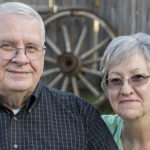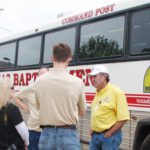MINERAL WELLS—Long before state officials called on church leaders to help meet the needs of foster children, a Baptist pastor in Mineral Wells and his family responded to God’s call to meet that challenge.
Texas First Lady Cecilia Abbott and H.L. Whitman Jr., commissioner of the Texas Department of Family and Protective Services, sent a letter to faith leaders Jan. 11 urging congregations around the state to join a “network of nurture” to help meet the needs of foster children and their families.
 Nathan and Kayla Buchanan of Mineral Wells are pictured in a Christmas card photo with their three biological daughters (left to right) Elaina, 14, Kate, 12, and Olivia, 9, along with a foster son whose image is obscured due to foster-care system privacy regulations.Nathan and Kayla Buchanan plugged into that network early. The pastor of First Baptist Church in Mineral Wells, his wife and their three biological children have opened their home to eight foster children, age 5 and younger, for various periods of time the last couple of years.
Nathan and Kayla Buchanan of Mineral Wells are pictured in a Christmas card photo with their three biological daughters (left to right) Elaina, 14, Kate, 12, and Olivia, 9, along with a foster son whose image is obscured due to foster-care system privacy regulations.Nathan and Kayla Buchanan plugged into that network early. The pastor of First Baptist Church in Mineral Wells, his wife and their three biological children have opened their home to eight foster children, age 5 and younger, for various periods of time the last couple of years.
After their third daughter was born nine years ago, the Buchanans felt God leading them to add to their family through adoption. After talking with an agency and learning more, the couple put together a life-book—a scrapbook about their family for the review of birth mothers who were considering the placement of their children.
“After three to four years, we didn’t have any birth mothers who chose us,” he said. “That was disappointing, but we realized later God was preparing us for foster care.”
Change the lives of whole families
As the Buchanans learned more about the foster care system, they resonated with its goal of reuniting children with their birth families and maintaining their ties to kin, culture and community.
“We wanted not only to change the life of one child or several children but to change the lives of whole families,” he said.
Buchanan learned about the urgent need for foster families from a speaker who addressed the local ministerial alliance.
Sign up for our weekly edition and get all our headlines in your inbox on Thursdays
“I found out there were 100 kids who needed to be placed and only three homes available in our county. We had kids from Palo Pinto County who were being placed as far south as Houston,” 300 miles away from birth parents and siblings, he noted.
Out of that ministerial alliance meeting, three churches—including First Baptist in Mineral Wells—agreed to sponsor awareness and orientation meetings for prospective foster parents. Those three meetings drew 90 participants. Three couples, counting the Buchanans, agreed to begin the process to become foster parents.
Completing 30 hours of training proved challenging for a pastor with a busy schedule and a mother trying to homeschool three children, particularly since it involved attending meetings in Arlington, 65 miles away.
Foster Care Redesign piloted
That experience made Buchanan an advocate for Foster Care Redesign, a program that stresses local solutions and contextualized approaches to facilitate the placement of children in homes close to their birth families and communities of origin.
The program takes into account the disparity between rural and urban areas in terms of access to resources—training, counseling, medical and dental care. Palo Pinto County was part of a seven-county region that served as a pilot for Foster Care Redesign.
Once the Foster Care Redesign pilot program was in place in Palo Pinto County, the Buchanans were able to complete the necessary training for foster parenting through online and in-home instruction.
“We have 19 (foster) homes in our county now, up from the three we had before,” Buchanan said. At one point, Palo Pinto County had more than two-dozen available, but about 50 percent of foster families are “one and done,” serving as foster parents on just one occasion.
Challenges of being foster families
Buchanan understands why half of foster families open their homes to children just one time.
“It’s hard,” he admitted. Families must adjust their schedules and living arrangements, and they bond with a child who ends up leaving their home.
One particularly difficult situation for his family arose when CPS moved a pair of siblings—a 3-year-old boy and 4-year-old girl—from their home after five months to place them with a different foster family. Their pain eased somewhat when they learned CPS found another foster family who was able to accept five children at the same time, reuniting the brother and sister with three siblings.
“It was good for them in that situation, but it still was sad for us to see them go,” Buchanan said.
‘All in this ministry together’
Every time a foster child leaves their home, the Buchanans hold a family meeting with their three daughters to discuss their continued involvement in foster parenting.
“We wouldn’t do it if we weren’t all in,” he said. “We’re in this ministry together.”
For however long a child is in their home, the Buchanans seek to provide a positive Christian influence.
“We teach them about Jesus, and we teach them to pray,” he said. “Those are seeds planted in their lives. We trust God they will grow, and others will come along to water them.”
Churches can provide care for foster families
Buchanan believes churches can do more to care for children in the foster system and provide “wraparound care” for foster families. It begins with awareness, he noted.
“I didn’t know about the need, I’m the pastor of First Baptist Church and was president of the ministerial alliance,” he said. “So, how can we expect our church people to know unless we make them aware?”
Once they discover the need, some church members may feel God leading them to complete the necessary background checks and training to become respite care providers for foster parents, he noted.
“Another way they can help is to come and do laundry” for a foster family—particularly in the hours immediately after a child is placed in a foster home, when they arrive with unlaundered clothing and other possessions in plastic trash bags, he said.
Foster families who struggle with the time constraints of transporting children to school, doctors’ appointments and other activities appreciate receiving meals, he added, based on personal experience.
Churches can aid in prevention by sponsoring parenting training and workshops to help struggling families in their communities, he said.
Individual Christians also can become advocates for reform of the child welfare system—including calling for increased funding for Child Protective Services, whose caseworkers are “overworked” and short-handed, Buchanan said.
Additional ways to be part of the network of nurture
In their letter to faith leaders, Abbott and Whitman recommended additional ways congregations could become part of the “network of nurture.” Their suggestions include:
- Survey church members to discover foster and adoptive families in the congregation.
- Mentor an older youth who is transitioning out of the foster care system. They particularly recommended The Open Table as a faith-based model that congregations can use to create community and transformation.
- Donate diapers, clothing, school supplies, car seats, cribs and bed for a Child Protective Services Rainbow Room, a resource center for foster families, or volunteer to sort items there.
- Join the CarePortal or Orphan Care Solutions online networks that help faith communities fulfill requests for goods and services by CPS caseworkers or others in the child welfare system.
- Participate in Blue Sunday, a national day of prayer for abused and neglected children, the last Sunday in April.
“Sometimes it takes a congregation to raise a child,” the letter stated. Abbott and Whitman urge congregations to contact Felicia Mason-Edwards, division administrator for faith-based programs at the Department of Family and Protective Services, at [email protected].
For more information from the Texas Baptist Christian Life Commission about foster care and how churches can be involved, click here.
Buchanan believes pastors need to preach on the subject.
“We don’t have a foster care ministry as just one more ministry at church. This is the ministry of the church,” he said. “James 1:27 says the pure and undefiled religion God accepts is to ‘look after orphans and widows in their distress.’ As Christians, we need to look after our kids in our communities. We are the ones who are called to care for kids in distress.”














We seek to connect God’s story and God’s people around the world. To learn more about God’s story, click here.
Send comments and feedback to Eric Black, our editor. For comments to be published, please specify “letter to the editor.” Maximum length for publication is 300 words.